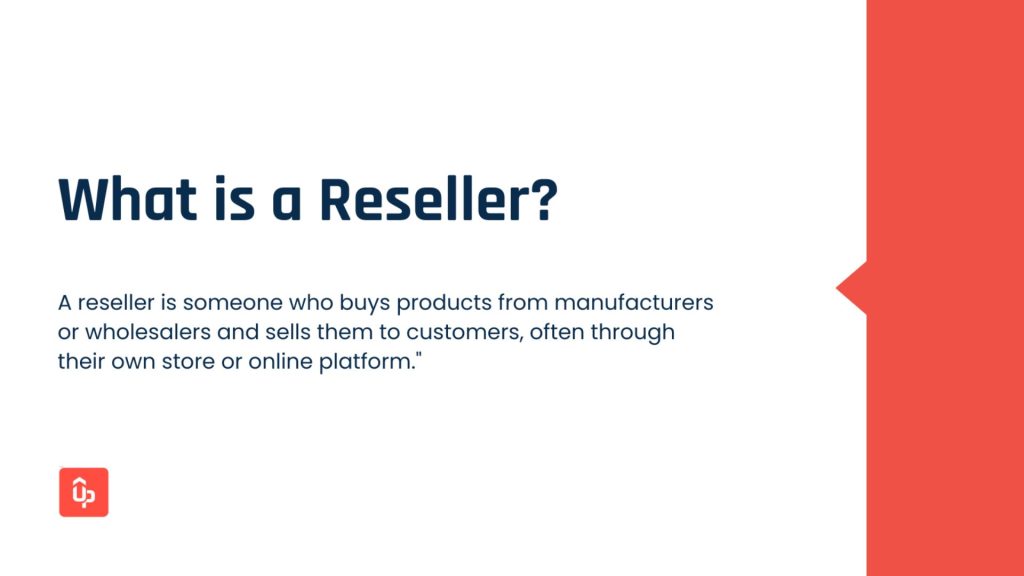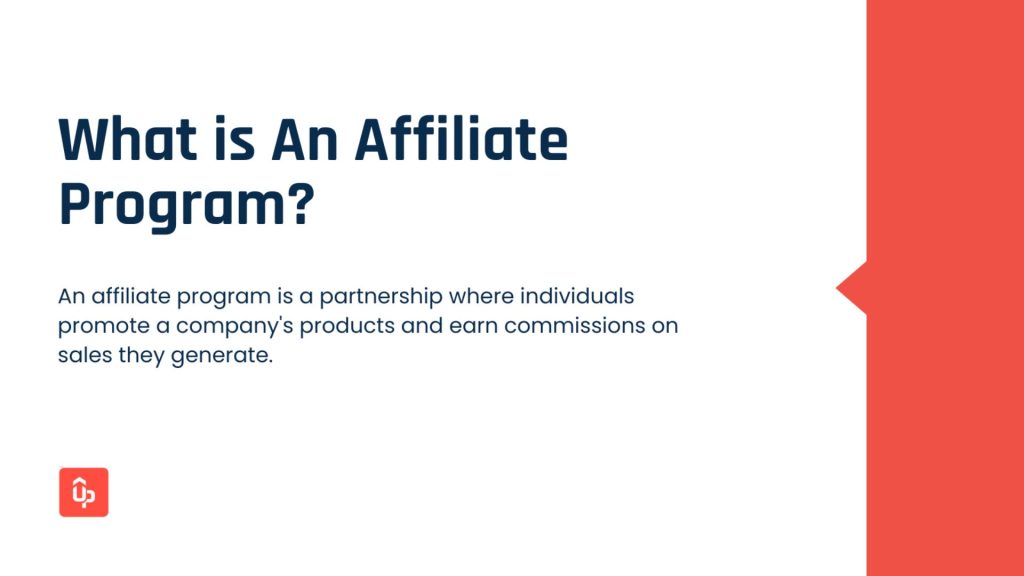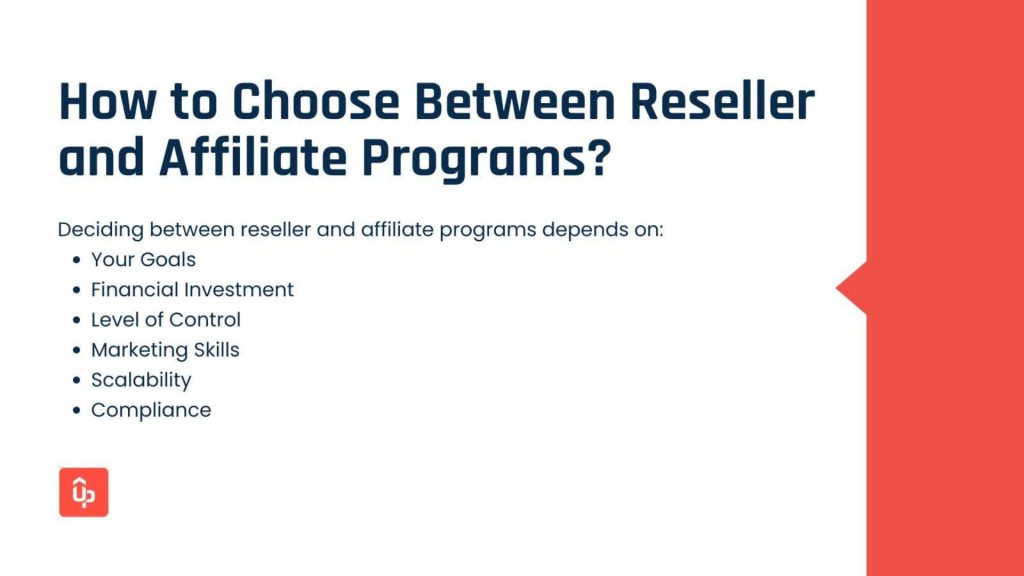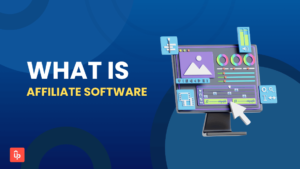Technology and the internet have helped brands make money and get noticed online. Reselling and affiliate marketing are powerful options for achieving these goals without starting a new business.
While they’re different, reselling and affiliate marketing have a lot in common and can seem similar if you’re not familiar with them.
But don’t worry; we’re here to help you understand them better and take advantage of these great opportunities.
Let’s dive in!
What is a Reseller?

As a reseller, you’re basically running a regular business. You buy products or services and then sell them as your own. Usually, you can buy them cheaper and sell them for more to make a profit.
For example, say you know a bunch of people who might want a software or product, but you don’t make it yourself. You can team up with a company that does and buy the products from them to sell to your potential customers.
You can sell the products for whatever price you like, making some serious cash. If you don’t want to start from scratch, joining a reseller program is a great option. You can even sell the product as your own, like putting your own label on it.
However, being a reseller can be a bit risky because you have to invest your own money upfront. Still, it’s cool because you get to decide how much money you make by setting your own prices. It’s like being the boss of your own little shop!
What is an Affiliate Program?

An affiliate program is a team-up between a business and folks who help bring in a customer base. Businesses pay these helpers, called affiliates, to send people their way.
Affiliates spread the word about the company’s stuff, usually through referral links or ads. When someone clicks an affiliate’s link and buys something, the affiliate gets paid.
It’s basically a way for businesses to get more customers and for affiliates to make money promoting high-quality products they like.
Let’s break down the concept:
- Merchants: These are the businesses offering the affiliate programs.
- Affiliates: They’re the people promoting the business’s products.
- Affiliate links: These are special links that help track sales.
- Commission: This is the money the business pays the affiliate for each sale they bring in.
Affiliates can earn money differently, like getting paid for each sale, lead, or click they generate. Affiliate marketing is big in e-commerce; you can find it all over the internet, from social media to blogs and review sites.
In affiliate marketing, affiliates are like promoters, spreading the word about products without handling inventory or customer service. Their job is to drive people to the business’s website while businesses decide how much to pay them.
It’s a way for companies to reach more people and for affiliates to earn some extra cash by sharing what they like.
Reseller vs Affiliate Program Comparison
Understanding the similarities and differences between these two models is important for figuring out which one suits your business best.
Similarity
Reseller programs and affiliate programs share some common benefits:
#1: No setup costs
Both programs don’t require any extra setup or upfront costs. The seller handles most of the infrastructure stuff like manufacturing and delivery.
As a reseller, you might need to handle some of the workload, but as an affiliate, you can simply sign up and start promoting without any hassle.
#2: Easy to start: Both programs offer a way to make extra money for brick-and-mortar businesses.
With a reseller program, businesses can buy products at a discount and sell them in their stores without the hassle of managing inventory or manufacturing.
Businesses partner with others to promote their products with affiliate marketing, earning money for each sale or referral.
For new brands, these programs make it easy to start earning money quickly without big investments. They can reach new customers and grow their business without a ton of effort.
#3: Business growth: Both programs can help boost your brand presence and expand your business. The money you make can be pure profit since you don’t have to invest in inventory.
You can use this revenue to grow your brand online and connect with partners and customers for long-term benefits.
Difference
Let’s take a look at this table:
| Feature | Resellers | Affiliate Programs |
| Product Handling | Resellers buy and hold inventory | Affiliates never handle products |
| Pricing strategy | Resellers set their own prices | Merchants set prices; affiliates may offer discounts |
| Customer Service | Resellers handle customer service | Merchants handle customer service |
| Marketing & Sales | Resellers manage their own marketing & sales | Affiliates promote products; merchants handle sales |
| Payment | Resellers pay upfront for products | Affiliates earn commission on sales |
| Target Audience | Businesses looking for bulk discounts and control over sales | Businesses wanting wider reach and marketing assistance |
When comparing resellers and affiliate programs, it’s like looking at two different ways of doing business.
For resellers, it’s all about buying products upfront and managing stock levels. They’re the ones dealing with customers directly, answering questions, and making sure everything runs smoothly.
On the other hand, affiliates don’t deal with any physical products. Instead, they focus on promoting products and earning commissions on sales they help generate.
Resellers have the freedom to set their own prices, while affiliates work with prices set by merchants.
When it comes to marketing and sales, resellers handle everything on their own, from advertising to making sales. However, for affiliates, it’s more about spreading the word and getting people interested in the product. They leave the actual selling to the merchants.
And when it comes to payment, resellers have to pay upfront for the products they want to sell, taking on some financial risk. However, affiliates earn money through commissions on sales, so the more they sell, the more they earn.
Choosing Between Reseller and Affiliate Programs

Deciding between reseller and affiliate programs depends on what you want to achieve:
Consider Your Goals
When deciding between a reseller and an affiliate program, it’s essential to align your choice with your business goals.
A reseller program is ideal if you aim to build your brand and have complete control over profit margins. This option suits individuals who are comfortable managing inventory and providing customer service.
On the other hand, if your focus is on promoting products and generating sales without upfront investment, an affiliate program might be more suitable. This choice is best for individuals with strong marketing skills and an established online presence.
Ultimately, your informed decision should reflect your comfort level, skills, and desired outcomes.
Financial Investment
When you’re choosing between being a reseller or joining an affiliate program, how much money you need to put in is a big deal.
Reseller programs need you to invest upfront to buy stuff to sell. It’s like putting down some cash before you start your business.
But with affiliate programs, you usually don’t need much or any money upfront. It’s like starting without needing a big pile of cash.
So, if you’re starting out and don’t have a lot to invest, affiliate marketing might be the better choice.
Level of Control
In terms of control, resellers have more say in pricing, branding, and customer service. They can set their own prices, build their brand, and directly interact with customers.
While affiliates have less control over pricing and customer service, as they primarily focus on promoting products and earning commissions from sales
Marketing Skills
If you’re a reseller, you’ve got to work hard to get people to buy from you. That means you need to make people know and like your shop.
How? Well, first, you need a cool name and a nice logo. Then, you have to tell people about your shop—maybe with flyers or ads.
Once people come in, you’ve got to treat them right, like asking if they need help finding something. And don’t forget to keep track of what sells well and what doesn’t, so you always have the right stuff in stock.
But picture yourself as an affiliate marketer. You’re like a superfan of a product, and you want everyone to know about it. Your job is to tell people how amazing this product is and convince them to buy it.
You do this by talking about it on social media, making videos, or writing blogs.
You also need to know what words people type into Google when they’re looking for this product so you can make sure your posts show up first.
Sometimes, you might even get paid if someone buys the product because of your recommendation!
Scalability
For resellers, scaling up can be tough. Why? Well, think about it. You’ve got to manage all that stuff you’re selling.
If you start selling more, you need more stuff to sell, right? But you also need to make sure you’re not buying too much and ending up with a bunch of stuff gathering dust on your shelves.
Now, being an affiliate is a bit different. You’re not dealing with physical stuff, so scaling up is a bit easier. Instead of having to worry about managing inventory, you can focus on getting the word out to more people.
You can spread your message far and wide through different ways, like social media, blogs, or videos. The more people you reach, the more chances you have to make sales. It’s like casting a wide net—you’re bound to catch more fish.
Compliance
As a reseller, you’ve got to keep an eye on the rulebook. Depending on what you’re selling, there might be special laws or rules you need to follow.
For example, if you’re selling food or medicine, there are extra safety standards you need to meet. It’s like making sure you’re driving the right speed on different roads—you’ve got to know the rules for each one.
Being an affiliate is usually a bit simpler when it comes to following the rules.
But don’t get too comfy!
There’s still one big rule you’ve got to stick to: telling people when you’re getting paid to promote something.
It’s like saying, “Hey, just so you know, I’m getting a little something if you buy this.” The FTC (that’s the folks who make the rules) wants everyone to play fair, so they’re pretty serious about this one.
Examples of Reseller and Affiliate Programs
Let’s take some examples:
Reseller Programs
Let’s imagine a situation where you decide to become a web hosting reseller:
Picture yourself as someone who loves technology and helping others. You notice that many small businesses struggle with setting up their websites, so you decide to lend a hand.
You team up with a trusted web hosting company that offers reseller packages. This means you can buy hosting services at a discount and sell them to your clients under your own brand.
You create a website showcasing your hosting services, emphasizing things like reliable uptime and friendly customer support. You even throw in extras like helping with website setup and handling domain registration.
Small businesses in your community appreciate having a local provider who cares about their needs. They sign up for your hosting services, and you take care of everything for them, from setting up their websites to keeping them running smoothly.
In this setup, you’re the reseller, getting hosting services from the provider and selling them to your clients. The web hosting company acts as the wholesaler, giving you discounted rates.
Affiliate Programs
Imagine a lifestyle blogger who shares tips on fashion, home decor, and cooking. The blogger often recommends products to his readers, who trust them.
To monetize the blog, the publisher joins the Amazon Associates program, which allows him to earn commission rates by promoting products available on Amazon.
He creates blog posts reviewing his favorite kitchen gadgets, fashion accessories, and home decor items and includes affiliate links to the products mentioned.
Whenever the readers click on these affiliate links and make a purchase on Amazon, he earn a percentage of the sale as a commission. This provides you with a passive affiliate income stream, allowing you to monetize your content without directly selling products or services.
In this example, the Amazon Associates program is the vendor, offering a wide range of products for promotion. As a blogger, he acts as the affiliate, promoting these products to his audience and earning commissions for sales generated through his affiliate links.
Reseller vs. Affiliate: Which is The Best Choice?
Whether you’re a well-established business or a freelancer/MMO entrepreneur (someone in the “Make Money Online” space), deciding between a reseller or affiliate program hinges on your marketing materials, goals, and risk tolerance.
Let’s break down the pros and cons of each approach for both categories:
As a business
Reseller Program:
Pros: You have more control over how your products are sold and can reach new customers through resellers. But you need to train them well and they might earn less profit per sale.
Cons: It takes time and effort to train and support resellers, and you might earn less profit per sale because you have to share it with them.
Affiliate Program:
Pros: You only pay for results, like sales, so it’s low risk. It can also help you reach a wider audience quickly. But you have less control over how your products are promoted.
Cons: It can be tricky to manage affiliates, and if they stop promoting your products, your sales might drop.
As a freelancer/MMO-er
Reseller Program:
Pros: You can make more profit per sale and build your own brand around the products you sell. But you’ll need to invest upfront and handle customer support.
Cons: It requires an upfront investment, managing inventory, and providing customer support.
Affiliate Program:
Pros: It’s easy to get started, and you can earn income streams by promoting other companies’ products. But your income might fluctuate, and there’s a lot of competition.
Cons: Your income depends on the stability of the affiliate programs you join, and you might not earn as much as with a reseller program.
Deciding between a reseller and affiliate program comes down to a few things: how much control you want, how much risk you’re okay with, how much money you can put in upfront, and how big you want to grow.
If you’re a big company, selling through resellers gives you control over how your products are sold and helps you reach more customers. But it comes with the challenge of training and supporting those resellers, and you might not make as much profit per sale.
With affiliate marketing, you can start a zero-cost marketing method; all sales are guaranteed, and you only pay your publisher when sales are made.
For MMO folks, affiliate marketing is also a low-risk way to earn money by promoting other people’s products without investing much upfront.
But remember, it’s important to think about what works best for you. Do you want control over your brand, or are you okay with others doing the selling while you earn some extra cash? Take a good look at your goals and what you can handle before you decide. It’s all about finding the right fit for you.
FAQs
- What are reseller programs?
Reseller programs let individuals or businesses sell products on behalf of a company. Resellers buy products at a discount and then sell them to customers at a higher wholesale price, keeping the profit.
- How do I become an affiliate reseller?
To become an affiliate reseller, sign up for the company’s affiliate program. Get a unique referral link and promote their products on your marketing channels such as website, social media, or email list. Earn commissions for every sale made through your link.
- What is the difference between an affiliate program and a wholesale?
In an affiliate program, you earn commissions by promoting another company’s products. With wholesale, you buy products at a discounted price and sell them at a higher price, keeping the profit. Affiliate marketing doesn’t involve buying or stocking inventory like wholesale does.
- What is the difference between a merchant and an affiliate?
A merchant is a company that sells products or additional services, while an affiliate partner promotes those products or services on their own platform. Merchants handle product creation, sales, and customer support, while affiliates earn commissions for referring customers to the merchant’s products or services.
Last words
In the end, both resellers and affiliates have their own unique paths to success. Whether you’re building your own brand from scratch or shouting from the rooftops about products you believe in, it’s all about finding what works for you and putting your heart into it. So, whether you’re stocking shelves or sharing links, keep hustling and making those dreams happen!








